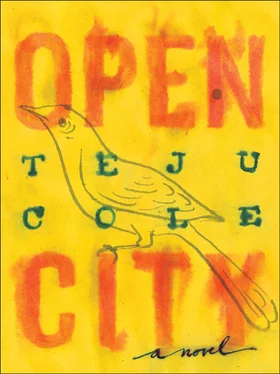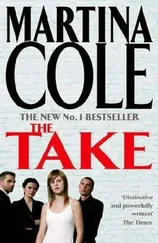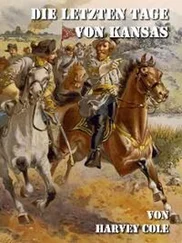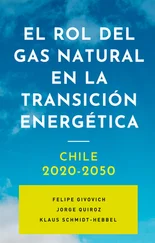I came out of the theater at midnight, into warm air. I had V.’s book with me, but after what I had just seen, I knew I would have to put it away for a while. At the almost empty subway station, there was a family of out-of-towners waiting for the train. A girl of thirteen sat on the bench next to me. Her ten-year-old brother came to join her. They were out of earshot of their parents who, save one or two unconcerned glances in our direction, were absorbed in their own conversation. Hey mister, she said, turning to me, wassup? She made signs with her fingers and, with her brother, started laughing. The little boy wore an imitation Chinese peasant’s hat. They had been mimicking slanted eyes and exaggerated bows before they came to where I was. They now both turned to me. Are you a gangster, mister? Are you a gangster? They both flashed gang signs, or their idea of gang signs. I looked at them. It was midnight, and I didn’t feel like giving public lectures. He’s black, said the girl, but he’s not dressed like a gangster. I bet he’s a gangster, her brother said, I bet he is. Hey mister, are you a gangster? They continued flicking their fingers at me for several minutes. Twenty yards away, their parents talked with each other, oblivious.
I thought about walking home, an hour’s walk, but the uptown train arrived. I had a moment of illumination just then, a feeling that my oma (as I am accustomed to calling my maternal grandmother) should see me again, or that I should make the effort to see her, if she was still in this world, if she was in a nursing home somewhere in Brussels. Perhaps seeing me would be some sort of late blessing for her. How I might go about actually locating her, I really had no idea, but the notion seemed suddenly real to me, as did its promise of reunion, as I walked down the platform and entered a distant car.
On an afternoon of heavy rain when ginkgo leaves were piled ankle-deep across the sidewalk looking like thousands of little yellow creatures freshly fallen from the sky, I went out walking. I had been spending all the time that wasn’t with patients working with a professor, Dr. Martindale, on a paper for publication. The findings of our study were genuinely exciting: we had been able to show a strong correlation between strokes in the elderly and the onset of depression. But our writing of the paper had been complicated by our late realization that another laboratory had recently come to similar conclusions, using a different research protocol. Dr. Martindale was approaching retirement, and the bulk of the rewriting fell to me, as did any new assays that had to be run in the lab. The latter I did a little carelessly, breaking gels twice and having to begin again. I was at it for three arduous weeks. Then I did most of the rewrite over three intense days, and we sent off the paper, and awaited correspondence from the journals. I went out, umbrella in hand, with the idea that I might walk through Central Park, and on to the area just south of it, and as I entered the park, thoughts of my grandmother returned.
My mother and I had become estranged from each other when I was seventeen, just before I left for America. I tend to connect this to my mother’s estrangement from her own mother. They might have fallen out for reasons as inchoate as the ones that separated my mother and me. My mother had not returned to Germany since she left in the 1970s. Nevertheless, in recent years I have thought of my oma more often. I usually dwell on the one time she came to visit us in Nigeria from Belgium, to which she had moved sometime after my grandfather’s death. The picture my mother had painted of her as a difficult and small-minded person was inaccurate; it was a picture that had nothing to do with my oma, and everything to do with my mother’s resentment of her. I was eleven when she came to visit, and I could see that both my parents were barely tolerating this strange old lady (my father sided with my mother). I also knew that part of what I was had come from her, and on this basis a sort of solidarity was established. Once during that visit, toward the end, as I recall, the whole family toured the interior of Yorubaland. Our journey took us no farther than four hours’ drive from Lagos. We visited the Deji’s Palace in Akure and the Ooni’s in Ife, both of them large traditional royal complexes built of mud brick and decorated with massive carved wooden pillars showing aspects of Yoruba cosmology: the world of the living, the world of the dead, the world of the unborn. My mother, deeply interested in the art, explained the iconography to her mother and to me. My father wandered around a little bored.
We drove for hours on muddy, welted roads, through undulating landscape that was sere in parts and thickly forested in others. We stopped at the Ikogosi Warm Springs, and went to the sacred monoliths of Olumo Rock in Abeokuta, in and under which Egba people had taken refuge during the internecine wars of the nineteenth century. At Olumo Rock, Oma and I had stayed at the base while my parents went up with a guide. From where we stood, I could see my parents wending their way up the sheer slope, stopping at caves and outcroppings as the guide pointed out historic and religious features to them, then renewing their climb which, to us looking from below, appeared especially dangerous. That day, I treasured the silence I shared with Oma (her hand on my shoulder, kneading it); my parents were gone an hour, and in that hour we two communed almost wordlessly, simply waiting, sensitive to the wind in the trees nearby, watching the lizards scuttle over the smaller rock formations that pushed through the earth like prehistoric eggs, listening to the thrum of motorcycles on the narrow road some two hundred yards away. When my mother and father came back down, winded, flushed, pleased, they marveled about their experiences. About ours, Oma and I could say nothing, because what it was had been without words.
Afterward, after Oma’s visit of a few weeks ended, my parents didn’t say much about her. Communication once again ceased between her and my mother, and it was as though she hadn’t ever come to Nigeria at all; the quiet, puzzled affection she had toward me faded into the past. As far as I could tell, she had returned to Belgium. And it was in Belgium that I imagined her now, though I could not say for sure if she was still alive. At the time of her visit to Nigeria, I had hoped a normal relationship between her and the rest of my family would begin. But it wasn’t meant to be; my guess is that there was a big argument between Oma and my mother just before she left. As things turned out, the only person who could tell me her present whereabouts, who could tell me if she had any present whereabouts, was the one person I couldn’t ask.
I ENTERED THE PARK AT SEVENTY-SECOND STREET, AND BEGAN to walk south, on Sheep Meadow. The wind picked up, and water poured down into the sodden ground in fine, incessant needles, obscuring lindens, elms, and crab apples. The intensity of the rain blurred my sight, a phenomenon I had noticed before only with snowstorms, when a blizzard erased the most obvious signs of the times, leaving one unable to guess which century it was. The torrent had overlaid the park with a primeval feeling, as though a world-ending flood were coming on, and Manhattan looked just then like it must have in the 1920s or even, if one was far enough away from the taller buildings, much further in the past.
The cluster of taxis at Fifth Avenue and Central Park South broke the illusion. After I had walked another quarter hour, by then thoroughly drenched, I stood under the eaves of a building on Fifty-third Street. When I turned around, I saw that I was at the entryway of the American Folk Art Museum. Never having visited before, I went in.
Читать дальше












